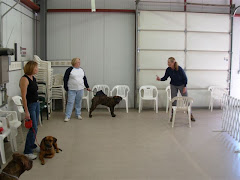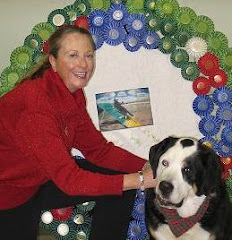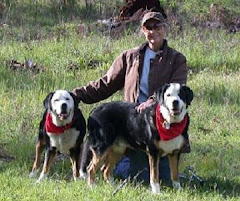Someone recently sent me an email about two nice Labs available for adoption. It was one of those emergency situations where both dogs had to get placed right away.
The problem was that the people wanted the dogs to be adopted TOGETHER. They pretty much insisted on it. Why? Because the two dogs had been inseparable all their lives. They were so dependent on each other that they could not handle the emotional stress of being separated.
What a shame! The owners of these two dogs did them a great disservice by allowing them to become so inseparable. I'm all for family togetherness and unity, but we MUST teach our dogs (and kids) how to be flexible enough to survive if the family, or pack, falls apart.
I've often had families wanting to sign up two dogs for the same class. I discourage it. My advice has always been to take the more difficult of the two dogs through class first...then start changing the way you do things at home, so the second dog can pick up on the new routines. It's not that you can't train two dogs at one time. It's that the dogs NEED to be separated from each other, so they can learn to survive and function independently. Taking one dog to class once a week, and leaving the other behind, is good for both dogs.
The human leaders should always be more important to each dog than the dogs are to each other. If the dogs choose each other's company over yours, something is haywire in your pack. Either dog should greatly value the individual time he or she gets to spend with you. That should be special time, as special as it gets. Ideally, Mom should take Dog A and Dad should take Dog B on separate field trips away from the house. Then reverse the pairings, so everyone gets separate "alone time" with each parent.
Have the dogs sleep separately as well. They can both be in the same bedroom, but should have separate beds or crates.
Take the dogs on separate walks. While it's fun to walk a "brace" of two dogs, the individual dogs will bond more closely with their humans if they go solo with you.
Do everything you can to teach your dogs that they can function quite well without the "other dog" in their lives. This will help them not only if you need to place them in new homes, but also if one of the dogs dies. The grief process will be shorter for the survivor.
Questions about dog behavior and training? Send them to: sandersagility@gmail.com.
Sunday, September 20, 2009
Subscribe to:
Post Comments (Atom)



















No comments:
Post a Comment